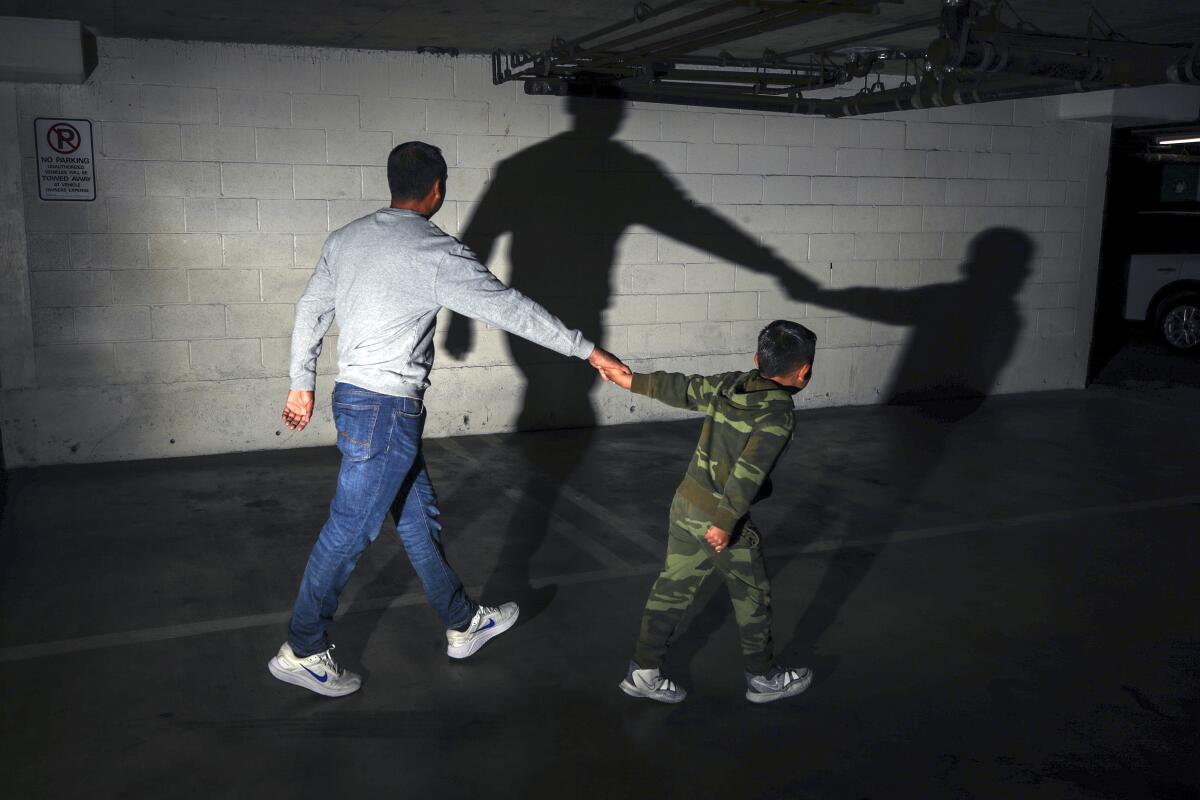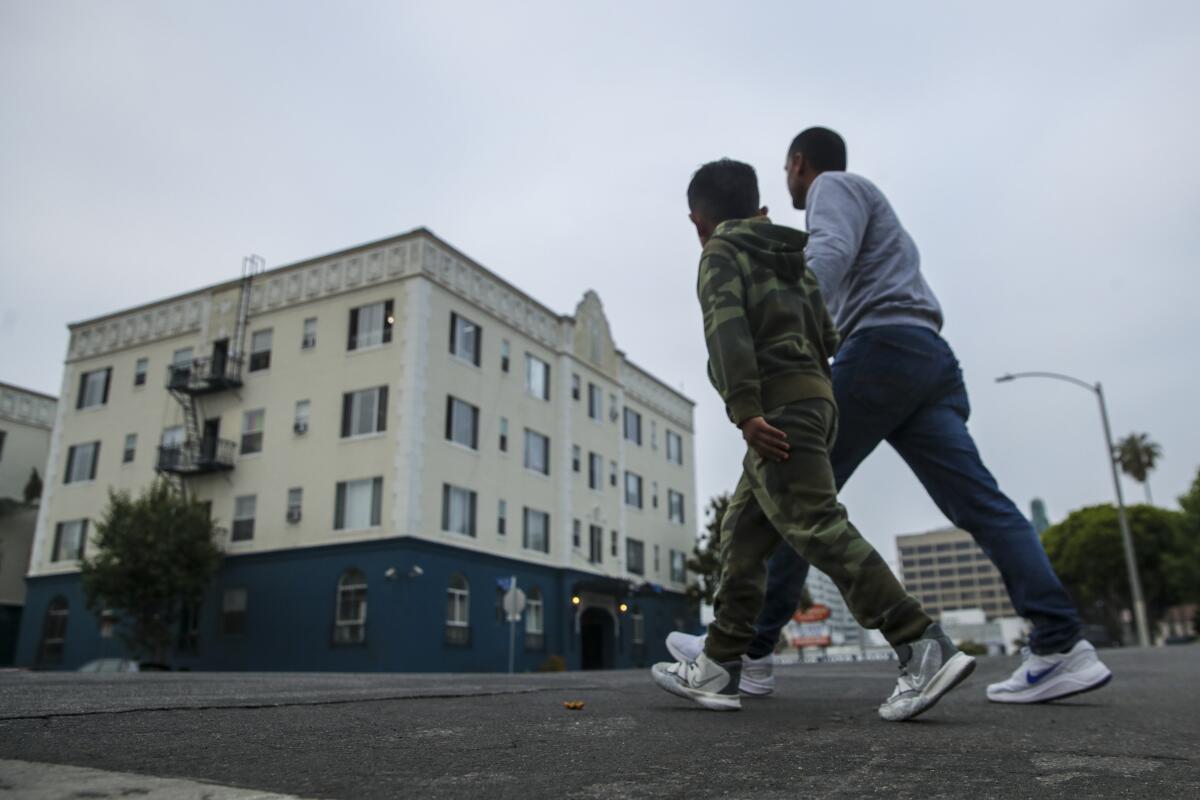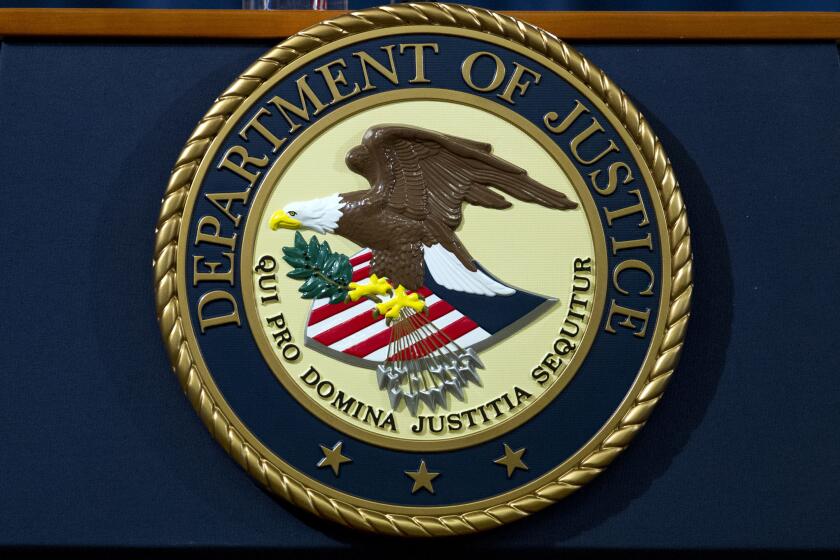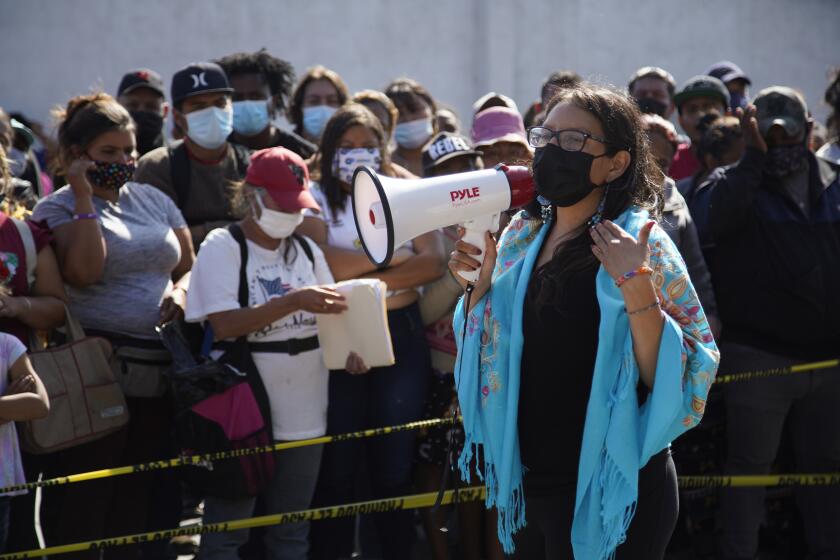99% of L.A. asylum seekers — many kids — in Biden program face deportation, report says

- Share via
After drug traffickers killed his little brother, William and his 6-year-old son, Santiago, fled Colombia in September to seek asylum in the United States.
Unbeknownst to William, who ended up in Los Angeles with a friend, he and his son immediately became part of a cohort of thousands of families in a “dedicated docket” program that the Biden administration established in 11 cities, including Los Angeles, in May 2021.
In response to a sudden rise of apprehensions last spring of families and children at the Southwest border, Biden promised the accelerated docket would resolve cases “more expeditiously and fairly.” These sorts of programs have existed in various forms under previous administrations; Biden’s program pushes immigration judges to resolve cases in 300 days, significantly shorter than the 4.5-year average of asylum cases in immigration court.
But according to a new Center for Immigration Law and Policy at UCLA Law report, the docket’s fast-track timeline has imposed new hardships on many asylum seekers and created additional obstacles that ultimately lead to higher rates of deportation orders, sometimes based on legal technicalities.

For William — who didn’t want his last name published, fearing reprisal against his family still living in Colombia — the docket’s expeditious nature meant he had only six weeks to secure legal representation before his first court hearing, leaving him to navigate a complex and often confusing system without an attorney. Immigration officials provided him with documents heavy with legal jargon in English. He could read only in Spanish.
In addition, those on the docket are released with “alternatives to detention,” which means they are monitored, either with an ankle bracelet or via a phone application. Immigration officials shackled William with a GPS monitor on his ankle before releasing him and his son.
Ultimately, an immigration judge ordered William and his 6-year-old to be deported in “absentia” when they didn’t show up for their court hearing at U.S. Immigration Court in downtown Los Angeles. In fact, at the time the judge gave the order, William was in the building, but was three floors below the courtroom in a waiting area at the direction of an Immigration and Customs Enforcement official. By the time William was told he was in the wrong place, the judge had already ordered the father and son’s removal from the U.S.
In Los Angeles, an estimated 99% of the 449 cases completed on the dedicated docket as of February of this year resulted in removal orders and about 72% of those cases were issued to people who missed their court hearing — “in absentia” — according to a report released Wednesday by the Center for Immigration Law and Policy and Immigrants’ Rights Policy Clinic at UCLA School of Law.
Perhaps most striking, the report shows that almost half of those in absentia removal orders are for children, many 6 and younger.
In addition, court data analyzed in the report show that an estimated 70% of people on this particular docket don’t have legal counsel. In contrast, an estimated 33% of those on the Los Angeles court’s non-accelerated docket lack legal counsel.
The nature of the accelerated dockets made it nearly impossible for asylum-seekers to get a fair hearing, the report’s authors concluded. The high absentia rate, the report concluded, is a red flag that the dedicated docket isn’t working as it should.
“It’s hard to imagine a greater miscarriage of justice,” said Talia Inlender, deputy director of the Center for Immigration Law, who co-authored the report. “This is a failure of the system.”
The Executive Office for Immigration Review, the U.S. Department of Justice subagency that oversees immigration courts and established the dedicated docket, did not respond to a request for comment.
The policy is the latest version of an old strategy to hear the newest cases first in an attempt to deter migration.
One year ago this week, the Biden administration announced the creation of the special docket for families, many seeking asylum in 11 cities, including San Francisco, Boston, El Paso and New York. The program was an attempt to bring order to the U.S. southern border after a sudden uptick last spring left the administration scrambling for solutions and posed a logistical, moral and political challenge to President Biden’s fledgling administration.
Theresa Cardinal Brown, director of immigration and cross-border policy at the Bipartisan Policy Center in Washington, D.C., said the high absentia rates in L.A.’s dedicated docket should concern administration officials.
“They need to figure out why people are not showing up,” she said. “ICE wants to believe that everyone is absconding, and the advocates want to believe that everyone is legitimate and has an asylum claim. The reality is that it is somewhere in the middle. And how far in the middle to which side? We don’t know.”
Biden’s accelerated docket and the associated outcome has been “recycled” from past administrations that were “ineffective and, frankly, unfair,” said retired immigration Judge Dana Leigh Marks, who sat on the immigration bench for more than 30 years.
“This is a repeat of failed programs in the past,” she said. “Why they think it would be different is a mystery.”
In July 2014, the Obama administration initiated an accelerated docket — often referred to as “rocket dockets” — for families seeking asylum. Two years later, data showed 70% of families whose cases were completed on the rocket docket never obtained representation. The overwhelming majority of these unrepresented families never applied for relief, and more than half were ordered removed — in absentia — when a family failed to appear.
In September 2018, the Trump administration launched its own version of an accelerated docket. Less than a year later, 80% of families on the docket had been ordered removed in absentia.
Marks, president emerita at the National Assn. of Immigration Judges, believes Biden launched the program in response to political pressure.
“The Biden administration is taking a beating on immigration from conservatives and liberals alike,” Marks said. Administration officials “are trying to do something that has these optics of success.”
Marks, who has long advocated for an independent immigration court that isn’t subject to the political pressures of presidential administrations, argues that 300 days simply isn’t enough time to properly put together an asylum case and adjudicate it fairly.
“You’re putting cases on a fast track when they are not ready to go and so people don’t have time to find attorneys,” said Marks, who has ruled on hundreds of asylum cases during her more than three-decade tenure in immigration court before she retired last year. “Supposedly the dedicated docket picked cities where there were pro bono attorneys more freely available. But I know for a fact that they don’t have the capacity to take these cases.”
The Biden administration promised that families would be “provided with a number of services, including access to information and services and possible referral services to facilitate legal representation,” according to a policy memorandum issued by the Executive Office for Immigration Review.
Days after Biden’s announcement, dozens of legal aid organizations warned the administration that there was no “capacity to provide pro bono legal services” to those on the accelerated docket.
“The reality on the ground is that legal providers in each of these ten cities are already under-funded and must reject a large number of requests for pro bono legal representation from non-citizens facing removal proceedings,” the June 21 memo stated.
Officials have quietly deployed a mobile app relying on facial recognition technology to collect data on asylum seekers before they cross the border.
In Los Angeles, asylum-seekers who are part of the dedicated dockets are provided with a double-sided sheet that lists phone numbers of 11 nonprofit legal service providers.
William called every phone number on the sheet. Many told him they were too busy to take on new cases. Others said they would call him back but didn’t. A few didn’t pick up the phone.
Without the help of an attorney, William found it impossible to decipher the legal jargon in the stack of immigration documents he received in English and ended up at the wrong floor on the date of his court hearing.
William’s story is quite common in immigration court, Marks said. But the speed of the accelerated docket is so rapid that it exacerbates the situation, she added. Asylum seekers have only a matter of weeks to find an attorney before their first hearing.
Desperate to reopen his case, William sought help at his 6-year-old’s school. The boy’s kindergarten teacher connected the father and son with the Immigrant Family Legal Clinic at the Robert F. Kennedy Community Schools in Koreatown.
The clinic helped William successfully file a motion to reopen his case. His next court date is in June. But six months after the mix-up, he still doesn’t have an immigration attorney.
More to Read
Sign up for Essential California
The most important California stories and recommendations in your inbox every morning.
You may occasionally receive promotional content from the Los Angeles Times.













